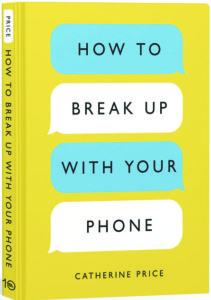 The avalanche of information we encounter on our phones pulls our brains in different directions and overloads our working memories, writes science journalist Catherine Price in her 2018 book How to Break Up With Your Phone. Over the short-term, the results are mental fatigue and difficulty concentrating; longer term, we are less likely to process new information and experiences in ways that lead to insights and ideas.
The avalanche of information we encounter on our phones pulls our brains in different directions and overloads our working memories, writes science journalist Catherine Price in her 2018 book How to Break Up With Your Phone. Over the short-term, the results are mental fatigue and difficulty concentrating; longer term, we are less likely to process new information and experiences in ways that lead to insights and ideas.
Add to that the negative effects that our phones have on the quality of our sleep, our memories, attention spans, and our productivity, and our interactions with our phones start to look a lot like being in a bad relationship.
But to break up? The fact of life for many people — including business-event planners — is that smartphones function as our professional lifelines. “Our smartphones have become the place where we get email, our actual phone calls, text messages — everything,” Price said. She’s not suggesting, however, that we cut smartphones out of our lives, but that we be intentional about how we use them.
“What I always recommend to people,” she said, “is to take a step back and ask themselves what relationship they want to have with their phone. Ask: What do I need to be as productive and efficient and as calm as possible? And then figure out how your phone would help you get those things.” There is no one answer that will be right for everybody, she adds.

You need a strategy because smartphones are engineered to get us to spend time on them, she writes. “Phone and app companies are aware of their product’s neurological effects [and] pack their products with features that will trigger them — with the specific goal of getting us to spend as much time and attention as possible on our devices.” And the more our focus weakens and we give in to our phone’s distractions, “the more we reinforce the mental circuits that make it hard for us to sustain our focus to begin with.”
One of the things that has “surprised and heartened” Price since her book came out is how many people from all different walks of life and demographic profiles tell her that they already had been thinking about changing how they use their smartphones — Price speaks on the topic to groups ranging from venture capitalists to schoolteachers.
“One of the things that’s the most powerful — and simultaneously inspirational and kind of upsetting — about this, is that this subject touches everybody. We all have these phones,” Price said. “There’s an infinite number of audiences to speak to, which is great and fun for me. But it also is kind of sad to look back at that first video of Steve Jobs launching the iPhone in 2007. I look at the people in the audience and think, ‘They’ve never used a touchscreen.’ There are audible gasps when [Jobs] talks about conference calling. … And then you think: That’s just 11 years ago. Now every single person, pretty much, has been affected by this technology and in ways that we’re only now beginning to pay attention to and understand.”
In her book, Price outlines a month-long plan designed to help people change their smartphone habits. “Regardless of who you are or what your job is, you can move in a positive direction,” she said. “You need to identify what the positive direction is first, and we often forget that. And you could take one step. Chances are that one step feels so good that you’re inspired to take the next step.”
Among the tips Price offers:
1. Become aware of how much you are using your smartphone. Price suggests downloading a tracking app such as Moment, which provides a daily report of how much time you spend on your phone. According to the app’s maker, the average amount of time that people spend on their phones is four hours a day, Price said. When asked about their usage, most people underestimate the amount of time they spend online by 100 percent.
2. Figure out which apps you actually need or like and get rid of the rest. When you’ve determine the apps that make you feel good or help support a habit that you want to engage in, put those on the home page, she said.
3. Go to app settings and turn off every notification you can. Notifications are made for the benefit of the app-maker, not for you, she said. “If you just let the default run, you’re going to end up being interrupted all of the time by stupid things that have no relevance to you, that will steal your attention and make you less effective and less efficient.”
4. Buy an alarm clock.“If you use your phone as your alarm clock, you will touch your phone first thing in the morning,” she said. Create a charging station for your phone that is elsewhere than in your bedroom, and create a nightly routine of plugging it in.



